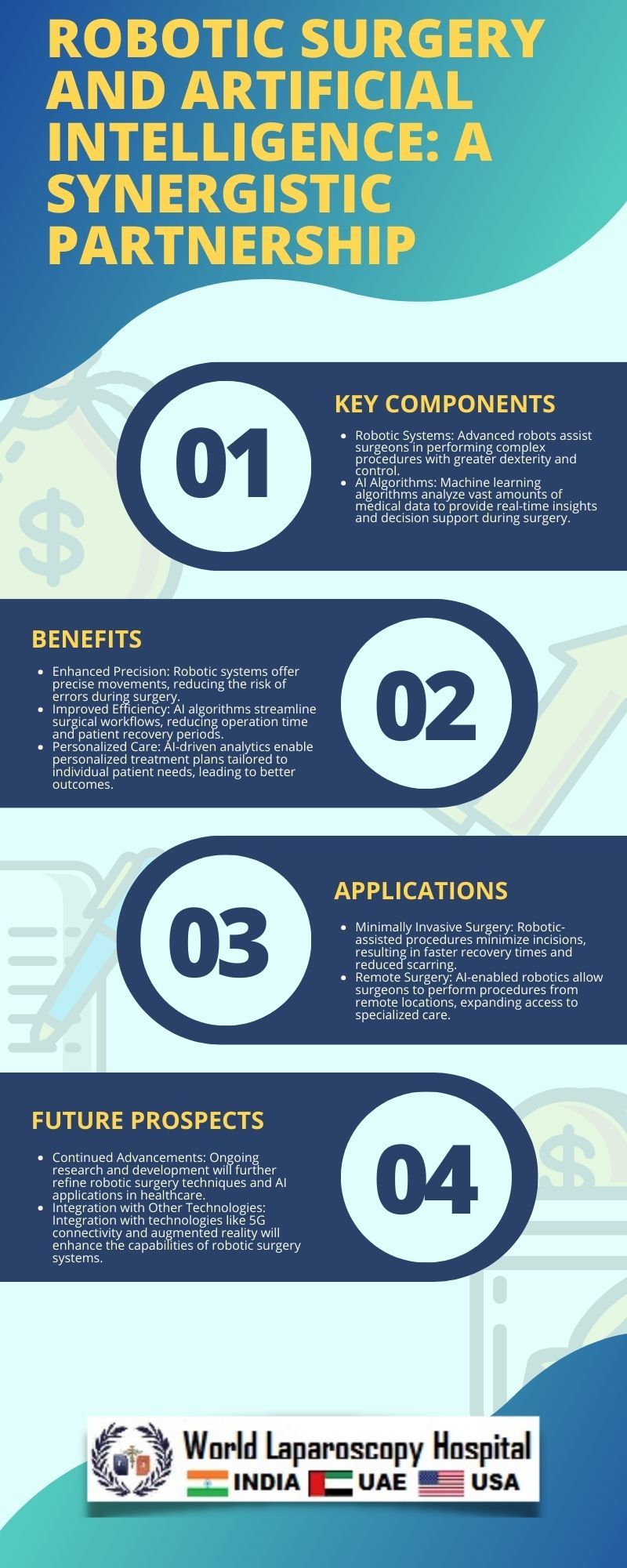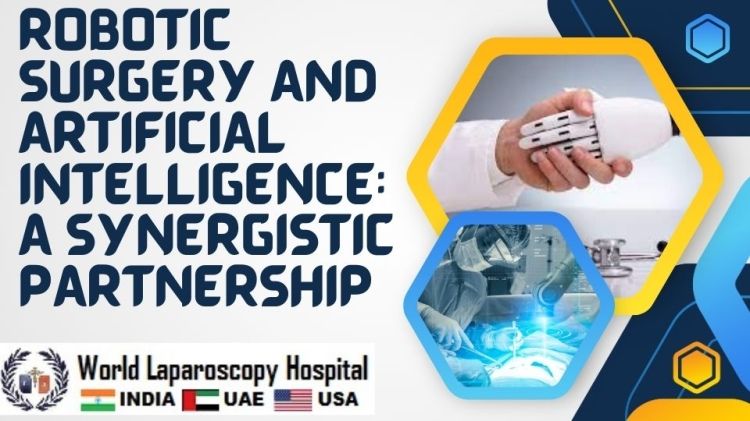Robotic Surgery and Artificial Intelligence: A Synergistic Partnership
Introduction:
In the ever-evolving landscape of healthcare, advancements in technology have continuously reshaped the way medical procedures are performed and patients are treated. Among these innovations, robotic surgery and artificial intelligence (AI) stand out as transformative forces, offering unprecedented precision, efficiency, and personalized care. The synergistic partnership between robotic surgery and AI has propelled the field of healthcare into a new era, promising enhanced outcomes, reduced complications, and improved patient experiences. In this article, we delve into the intricacies of this dynamic relationship, exploring its impact on modern medicine and the promising future it holds.

The Evolution of Robotic Surgery:
Robotic surgery has rapidly evolved from a novel concept to a mainstream practice in various surgical specialties. Initially developed to overcome the limitations of traditional laparoscopic surgery, robotic systems such as the da Vinci Surgical System have revolutionized minimally invasive procedures. These sophisticated platforms provide surgeons with enhanced visualization, dexterity, and control, enabling precise maneuvers in complex anatomical spaces.
The integration of robotics into surgical workflows has expanded the scope of procedures that can be performed minimally invasively, ranging from simple appendectomies to intricate cardiac surgeries. By leveraging robotic assistance, surgeons can navigate with greater ease through intricate surgical pathways, resulting in reduced trauma, faster recovery times, and improved cosmetic outcomes for patients.
Artificial Intelligence in Healthcare:
Artificial intelligence has emerged as a powerful tool in healthcare, offering unparalleled capabilities in data analysis, pattern recognition, and decision-making. AI algorithms can sift through vast amounts of medical data, including patient records, imaging studies, and genomic information, to extract valuable insights and guide clinical decision-making.
In diagnostics, AI-powered imaging techniques can detect subtle abnormalities that may evade the human eye, facilitating earlier detection of diseases such as cancer and cardiovascular conditions. Moreover, AI-driven predictive analytics can identify patients at risk of developing complications or diseases, allowing for proactive interventions and personalized treatment strategies.
The Synergy Unleashed:
The convergence of robotic surgery and artificial intelligence represents a paradigm shift in modern healthcare, unlocking synergies that transcend the capabilities of each technology in isolation. At the core of this partnership lies the concept of data-driven surgery, where real-time feedback from robotic systems is seamlessly integrated with AI-driven insights to optimize surgical outcomes.
One of the key advantages of this synergistic approach is the ability to leverage preoperative imaging data to create patient-specific surgical plans. AI algorithms can analyze imaging studies to identify optimal surgical trajectories, anatomical landmarks, and potential complications, providing surgeons with invaluable guidance before entering the operating room. These personalized surgical plans can improve efficiency, accuracy, and patient safety during procedures.
During surgery, robotic systems equipped with AI capabilities can continuously monitor physiological parameters, anatomical variations, and intraoperative dynamics in real-time. By processing this information instantaneously, AI algorithms can detect subtle changes, anticipate potential complications, and suggest adaptive strategies to optimize surgical outcomes. This real-time decision support can enhance surgical precision, mitigate errors, and reduce the need for intraoperative revisions, ultimately improving patient outcomes and reducing healthcare costs.
Furthermore, the integration of AI-driven analytics into postoperative care enables proactive monitoring and early detection of complications. By analyzing patient data collected from wearable devices, electronic health records, and remote monitoring systems, AI algorithms can identify deviations from expected recovery trajectories and alert healthcare providers to intervene promptly. This proactive approach to postoperative care can prevent complications, reduce hospital readmissions, and enhance long-term patient outcomes.
Challenges and Opportunities:
Despite the immense potential of robotic surgery and artificial intelligence, several challenges must be addressed to realize their full benefits in clinical practice. Technical complexities, including the integration of disparate systems, interoperability issues, and standardization of data formats, pose significant hurdles to widespread adoption. Moreover, concerns regarding patient privacy, data security, and regulatory compliance necessitate robust frameworks and ethical guidelines to govern the use of AI in healthcare.
However, amidst these challenges lie abundant opportunities for innovation and collaboration. Continued advancements in robotic technology, such as the development of miniaturized robotic platforms and haptic feedback systems, hold promise for expanding the applications of robotic surgery to new domains and improving patient outcomes further. Similarly, ongoing research in AI, including deep learning algorithms, natural language processing, and predictive modeling, will continue to push the boundaries of what is possible in personalized medicine and precision surgery.
Conclusion:
The synergistic partnership between robotic surgery and artificial intelligence represents a transformative force in modern healthcare, reshaping the way surgical procedures are performed, patients are treated, and outcomes are optimized. By harnessing the power of robotics and AI, clinicians can deliver personalized, precision-driven care that maximizes efficacy, minimizes complications, and enhances patient experiences. As this dynamic field continues to evolve, collaboration among clinicians, engineers, data scientists, and policymakers will be essential to harnessing its full potential and ushering in a new era of healthcare excellence.


